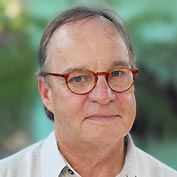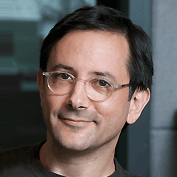SoundVision’s radio documentaries have been recognized for excellence with numerous honors, including two Peabody awards, and earned the trust of leaders in science, education and broadcasting. SoundVision is dedicated to bringing compelling stories to public radio listeners and exploring new ways to inform the public through interactive web offerings, hands-on training workshops, community outreach, and partnerships with ethnic and alternative press organizations.
The Adaptors
Synopsis
 Flora Lichtman
Flora LichtmanThe Adaptors is a bi-weekly podcast and video series that chronicles how people are adapting to climate change. Host Flora Lichtman has been covering science and the environment for the last decade. She is the co-director New York Times Op-Docs series “Animated Life” — short films on scientific discoveries, and she was the managing editor of video and substitute host at public radio’s Science Friday.
The Adaptors finds people from all walks of life who are creatively heading-off our energy and climate crisis. These DIY solutions and human-scale stories provide a window into to the essence of who we are as a species, and a measure of hope that humans can muster the will to tackle the biggest challenge we’ve ever faced.
We’re also producing a one hour public radio special for Earth Day (April 22) with co-host Alex Chadwick.
Audio Samples
Video Samples
BURN: An Energy Journal
Synopsis

Alex Chadwick
BURN: An Energy Journal is a public radio and web project hosted by trusted journalist and master storyteller Alex Chadwick.
He and our BURN team visit visionaries, research scientists, industry insiders and concerned citizens across the country to track energy innovation, production, distribution and environmental impact.
Energy powers our homes and our economy. It creates uneasy alliances and disturbing divisions. It empowers some and impoverishes others. How do we get energy? Where does it come from? What, ultimately, is energy?
American Public Media distributes the one-hour BURN radio specials. APM’s Marketplace broadcasts our feature-length stories.
Audio Samples
Video Samples
TRBQ: The Really Big Questions
Synopsis

Dean Olsher
TRBQ: The Really Big Questions operates at the intersection of science and the humanities. Hosted by journalist, author and curious guy, Dean Olsher, the programs are creative, interdisciplinary dialogs about what makes us human. Who are we as a species? What is our relationship to the world and the universe?
In our first TRBQ radio series, 240 stations in 175 countries broadcast the hour-long investigations into emotion, consciousness and religion. Our distributors were the Armed Forces Network and NPR Worldwide.
We return in early Spring 2014, via Public Radio International, with the topics: sharing, music, love, death and truth. And we continue our collaboration with the Exploratorium, a hands-on museum of science, art and human perception in San Francisco. Together, we’ll present immersive “learning laboratories” for their exhibition space, give talks in their After Dark series for young adults and create multimedia online experiences.
Audio Samples
The DNA Files
Synopsis
From 1998 to 2007 SoundVision researched and produced 19 one-hour radio programs of The DNA Files, hosted by John Hockenberry. The result was comprehensive coverage of the science of genetics and the newer but equally influential field of epigenetics — yes, we are our genes, but also much more.
The award-winning series was part explanation, part revelation. It ran on more than 300 public radio stations and the Armed Forces Network. It had the highest carriage of any special programming NPR distributed in 2007.
An extensive outreach campaign brought DNA-related learning materials into local newsrooms and classrooms across America. Through our Exploratorium partnership, we created activities and materials for an hour-long workshop geared for ages 7 to 12.
Our Ethnic Media Fellows program helped journalists develop articles that built upon the documentary series for publication in ethnic media print outlets (see “Tips on Science Reporting for Ethnic Media” by Rong Xiaoqing, staff reporter, Sing Tao Daily). Our Station and Network Partners enabled stations to produce companion programming for their local broadcasts.
Audio Samples
Outreach Example: Introductory Genetics Course
An example “Animal/Plant Worksheet” (PDF) from The DNA Files/Exploratorium course (ages 7-12) in Introductory Genetics:
Science Literacy Project
Synopsis
A reporter setting out to tell a science story to a lay audience needs to grasp the science behind the story. SoundVision sponsors mid-career public radio producers and reporters in an intensive, six-day training workshop. Participants emerge from the Science Literacy Project with the tools to report on complicated subjects with insight, clarity and imagination.
In addition to formal and participatory presentations by expert practitioners of science journalism, radio production, research and storytelling, Science Literacy fellows experience lectures by scientists and educators in such fields as chemistry, statistics, genetics, and evolutionary science.
Fellows are provided with background reading for each presentation, bibliographies of each subject, and commissioned “tip sheets” highlighting professional skills.
These are some of the Science Journalism Resources produced for the project:
- “Tips for Public Radio Science Reporters: How to Start Covering Something You Know Nothing About” by Loretta Williams
- “Recording in Far-Away Places” by Danial Grossman
- “Fact-Checking Essentials” by Jennifer Jongsma.
